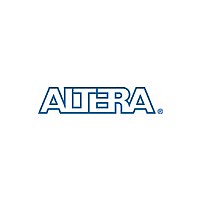EP3C16F256I7N Altera, EP3C16F256I7N Datasheet - Page 275

EP3C16F256I7N
Manufacturer Part Number
EP3C16F256I7N
Description
Cyclone III
Manufacturer
Altera
Available stocks
Company
Part Number
Manufacturer
Quantity
Price
Company:
Part Number:
EP3C16F256I7N
Manufacturer:
IR
Quantity:
14 520
Company:
Part Number:
EP3C16F256I7N
Manufacturer:
ALTERA31
Quantity:
214
Part Number:
EP3C16F256I7N
Manufacturer:
ALTERA/阿尔特拉
Quantity:
20 000
- Current page: 275 of 582
- Download datasheet (7Mb)
Figure 10–10. Byte-Wide Multi-Device AP Configuration
Notes to
(1)
(2)
(3)
(4)
(5)
(6)
Altera Corporation-Preliminary
March 2007
From Switch/Button or Other Master Controller
Spansion S29WS-N Flash
Connect the pull-up resistors to V
Connect the pull-up resistor to the V
The nCEO pin can be left unconnected or used as a user I/O pin when it does not feed another device’s nCE pin.
The MSEL pin settings vary for different configuration voltage standards and POR time. You must set the
Cyclone III master device in AP mode and the slave devices in FPP mode. To connect MSEL[3..0] for the master
device in AP mode, refer to
refer to
The current implementation for AP configuration ignores the RDY pin. However it is recommended that you connect
this pin.
Connect the repeater buffers between the Cyclone III master and slave device(s) for DATA[15..0] and DCLK. All
I/O inputs must maintain a maximum AC voltage of 4.1V. The output resistance of the repeater buffers has to fit the
maximum overshoot equation outlined in
Intel P30 Flash/
Figure
RST#/RESET#
A[24:1]/A[23:0]
ADV#/AVD#
Table 10–12 on page
WAIT/RDY
DQ[15:0]
10–10:
WE#
OE#
CLK
CE#
GND
Byte-Wide Multi-Device AP Configuration
The first method is the byte-wide multi-device AP configuration and is
the simpler form. In the byte-wide multi-device AP configuration, the
least significant byte DATA[7..0] from the flash and master device set
to AP configuration scheme is connected to each of the slave devices set
to FPP configuration scheme, as shown in
Table 10–8 on page
10–61. Connect the MSEL pins directly to V
Buffers (6)
nCE
DCLK
nRESET
FLASH_nCE
nOE
nAVD
nWE
RDY (5)
DATA[15..0]
PADD[23..0]
Cyclone III Master Device
CCIO
10k
V
CCIO
CCIO
supply of the bank the pin resides in.
(1)
MSEL[3..0]
supply voltage of I/O bank that the nCEO pin resides in.
10k
“Configuration and JTAG Pin I/O Requirements” on page
V
nCEO
CCIO
10–30. To connect MSEL[3..0] for the slave devices in FPP mode,
Active Parallel Configuration (Supported Flash Memories)
10k
(1)
V
DQ[7..0]
CCIO
(4)
(2)
nCE
DATA[7..0]
DCLK
Cyclone III Slave Device
MSEL[3..0]
Cyclone III Device Handbook, Volume 1
CCIO
nCEO
10k
or GND.
V
DQ[7..0]
CCIO
Figure
(4)
(2)
nCE
DATA[7..0]
DCLK
Cyclone III Slave Device
10–10.
MSEL[3..0]
nCEO
10–13.
10–39
(4)
N.C. (3)
Related parts for EP3C16F256I7N
Image
Part Number
Description
Manufacturer
Datasheet
Request
R

Part Number:
Description:
CYCLONE II STARTER KIT EP2C20N
Manufacturer:
Altera
Datasheet:

Part Number:
Description:
CPLD, EP610 Family, ECMOS Process, 300 Gates, 16 Macro Cells, 16 Reg., 16 User I/Os, 5V Supply, 35 Speed Grade, 24DIP
Manufacturer:
Altera Corporation
Datasheet:

Part Number:
Description:
CPLD, EP610 Family, ECMOS Process, 300 Gates, 16 Macro Cells, 16 Reg., 16 User I/Os, 5V Supply, 15 Speed Grade, 24DIP
Manufacturer:
Altera Corporation
Datasheet:

Part Number:
Description:
Manufacturer:
Altera Corporation
Datasheet:

Part Number:
Description:
CPLD, EP610 Family, ECMOS Process, 300 Gates, 16 Macro Cells, 16 Reg., 16 User I/Os, 5V Supply, 30 Speed Grade, 24DIP
Manufacturer:
Altera Corporation
Datasheet:

Part Number:
Description:
High-performance, low-power erasable programmable logic devices with 8 macrocells, 10ns
Manufacturer:
Altera Corporation
Datasheet:

Part Number:
Description:
High-performance, low-power erasable programmable logic devices with 8 macrocells, 7ns
Manufacturer:
Altera Corporation
Datasheet:

Part Number:
Description:
Classic EPLD
Manufacturer:
Altera Corporation
Datasheet:

Part Number:
Description:
High-performance, low-power erasable programmable logic devices with 8 macrocells, 10ns
Manufacturer:
Altera Corporation
Datasheet:

Part Number:
Description:
Manufacturer:
Altera Corporation
Datasheet:

Part Number:
Description:
Manufacturer:
Altera Corporation
Datasheet:

Part Number:
Description:
Manufacturer:
Altera Corporation
Datasheet:

Part Number:
Description:
CPLD, EP610 Family, ECMOS Process, 300 Gates, 16 Macro Cells, 16 Reg., 16 User I/Os, 5V Supply, 25 Speed Grade, 24DIP
Manufacturer:
Altera Corporation
Datasheet:












